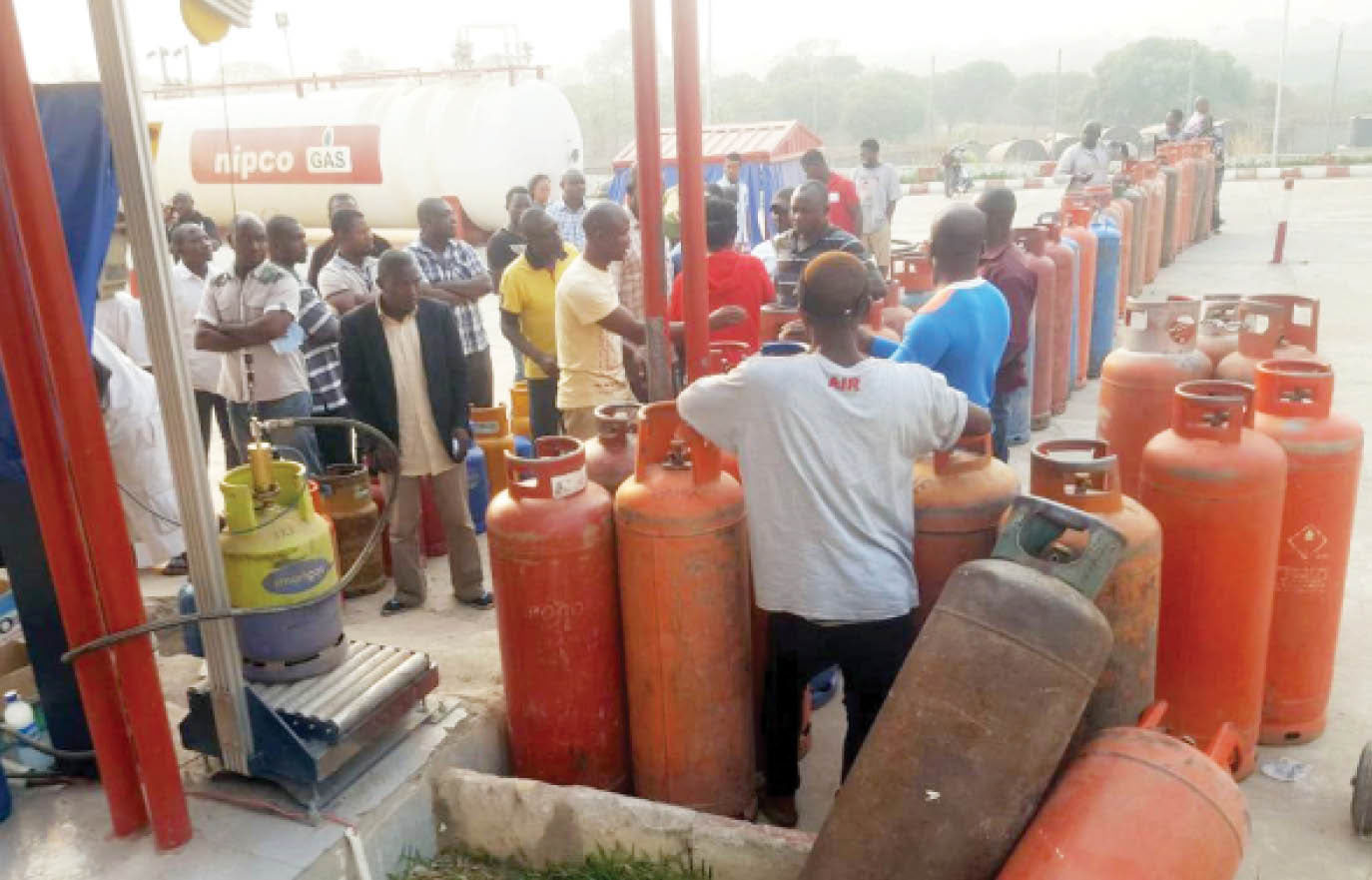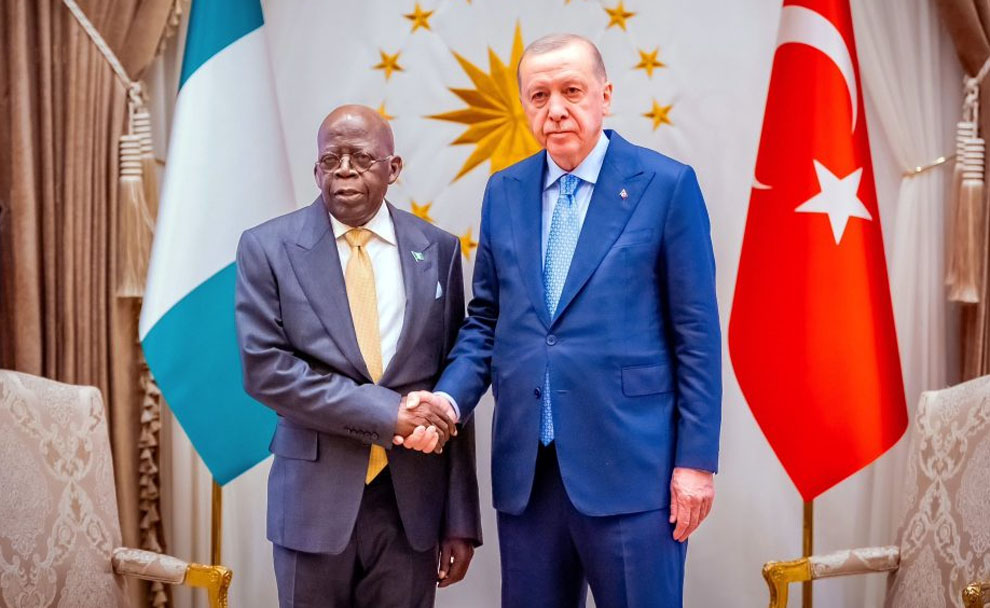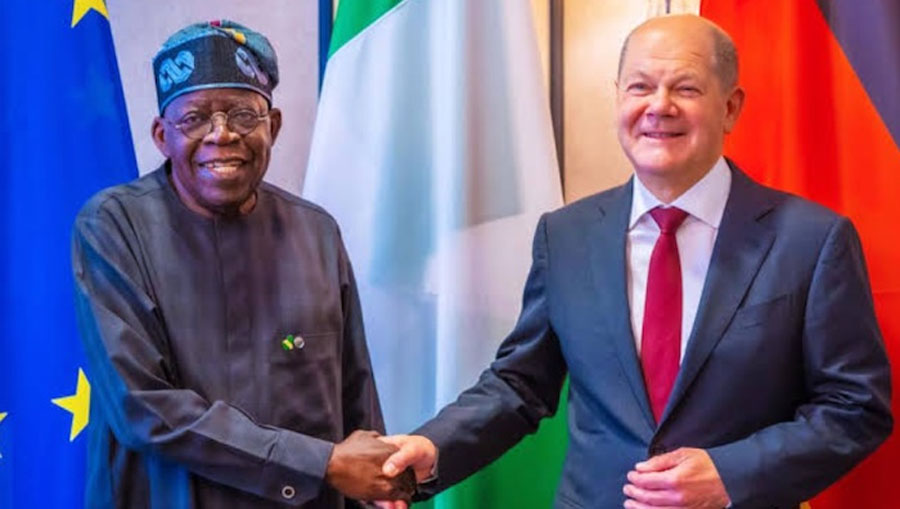News
FG bans export of cooking gas to crash prices

FG bans export of cooking gas to crash prices
The Federal Government has banned the exportation of Liquefied Petroleum Gas (LPG) also known as cooking gas in order to increase the volume of supply and crash the prices across the country.
This was made known to journalists by the Minister of Petroleum (Gas), Ekperikpe Ekpo, at the ‘Internal Stakeholders’ workshop on Thursday, February 22, 2024, in Abuja.
The minister who spoke at the sideline of the event stated that the LPG producers had been told to stop exporting the commodity out of Nigeria, following the recent jump in the cost of cooking gas.
The theme of the workshop is “Harnessing Nigeria’s Proven Gas Reserves for Economic Growth and Development.”
FG discussing with stakeholders
When asked what the government has done to control the rising cost of domestic gas, Ekpo said the ministry is discussing constantly with critical stakeholders like the Nigerian Midstream and Downstream Petroleum Regulatory Authority and operators such as Mobil, Chevron, and Shell to address the issue.
READ ALSO:
- BREAKING: Ighodalo emerges PDP Governorship candidate for Edo polls
- Troops kill wanted terrorist leader, Boderi Isyaku, in Kaduna
- Man ‘machetes’ lover for failing to show up on Valentine’s Day after collecting N7,000
He explained that once there is a stoppage of the export of locally produced domestic gas, there will be more volume for the domestic market which will automatically reduce the price of the product.
- He said, “We are interacting with critical stakeholders to ensure that there is no exportation of LPG.
- “All LPG produced within the country will have to be domesticated. And when this is done, the volume will increase and of course, the price will automatically crash.
- “With the issue of gas, you have seen the demonstration of the Federal Government by withdrawing all taxes and levies from the importation of gas-related equipment. It is a big incentive.
- “On the issue of LPG (cooking gas), we are interacting with the critical sectors to ensure that there is no exportation of LPG. All LPG produced within the country will have to be domesticated. And when this is done, the volume will increase and, of course, the price will automatically crash.
- “I’m in contact with the regulator, NMDPRA, we have meetings almost daily with the producers of the gas like Mobil, Chevron and Shell. So there is that hope that things will turn around.
- “And that is also why we are having this engagement to know exactly what the problems are so that we can address them once and for all.”
What you should know
- There have been reports of escalating prices of cooking gas in major cities across the country with the prices hovering between N17,000 and N18,000, as against the N9,000 the product was selling around November last year.
- Earlier in September 2023, gas retailers under the aegis of the Nigerian Association of Liquefied Petroleum Gas Marketers warned that the price of a 12.5kg cooking gas cylinder could surge to N18,000 by December 2023 if the Federal Government does not intervene to regulate the actions of terminal owners.
- The president of the association, Olatunbosun Oladapo, attributed this unjustifiable price hike to terminal owners who, he alleged, are exploiting the excuse of a high foreign exchange rate to increase prices, causing significant hardship to the general population.
FG bans export of cooking gas to crash prices
News
Police to Arrest TikToker Mirabel After She Recants False Rape Claim

Police to Arrest TikToker Mirabel After She Recants False Rape Claim
The Ogun State Police Command has confirmed plans to arrest and prosecute TikTok user Mirabel after she admitted that her viral rape allegation was false, authorities and investigative reports indicate.
Mirabel, a social media influencer, first sparked national attention after posting videos alleging she had been sexually assaulted in her home in Ogijo, Ogun State. The posts quickly went viral, drawing widespread outrage, calls for justice, and prompting the police to launch an immediate investigation.
An audio recording of a phone conversation, shared online by social media personality VeryDarkMan (VDM), reportedly captures Mirabel acknowledging that parts of her story were fabricated. In the recording, she apologises and admits creating a threatening TikTok account to support her narrative, claiming she had been taking drugs at the time and “was not thinking clearly” when posting the videos.
READ ALSO:
- Again, Early Morning Blaze Destroys Dozens of Shops in Kano Market
- Suspected Terrorists Warn Kebbi Residents: Pay ₦100 Million or Face Attack
- ICPC Searches El-Rufai’s Abuja Home Amid Multi-Agency Corruption Investigation
A police source said senior officers, including the Divisional Police Officer, were at the hospital where Mirabel was receiving medical care. Once she is discharged, she will be taken into custody and formally charged under provisions of Nigeria’s Criminal Code relating to false reporting of sexual offenses. “The essence is to serve as a deterrent to others,” the source added.
The Ogun State Police had earlier ensured that Mirabel received medical treatment and support, following procedures to protect her health while the investigation continued. The Lagos State Domestic and Sexual Violence Agency (DSVA) confirmed that the incident fell outside its jurisdiction and forwarded all relevant information to the Ogun authorities.
This development has sparked public debate about the responsible use of social media, the impact of false allegations, and the importance of evidence-based reporting. Legal experts warn that fabricating sexual assault claims can carry serious criminal penalties and may undermine the credibility of genuine victims.
Authorities continue to urge the public to avoid spreading unverified claims and to cooperate with law enforcement in ongoing investigations. Updates on the case will be issued by the Ogun State Police Command as formal legal proceedings begin.
News
Tinubu Reduces Reliance on U.S, Strengthens Defence Partnerships With Turkey, EU

Tinubu Reduces Reliance on U.S, Strengthens Defence Partnerships With Turkey, EU
President Bola Tinubu has commenced a strategic expansion of Nigeria’s defence diplomacy, engaging the European Union (EU) and Turkey to strengthen the nation’s security architecture while reducing overreliance on the United States. The initiative comes as Nigeria faces multiple security threats, including Boko Haram insurgency in the north-east, farmer-herder clashes in the north-central region, separatist violence in the south-east, and escalating banditry in the north-west.
The move coincided with a visit to Brussels by National Security Adviser Mallam Nuhu Ribadu, who led discussions at the first EU-Nigeria Peace, Security, and Defence Dialogue. Both sides agreed to deepen collaboration on regional stability, counter-terrorism, and violent extremism, while enhancing intelligence sharing, maritime security, and cybersecurity cooperation. An EU diplomat in Abuja emphasized that the bloc would provide non-lethal military support, while respecting Nigeria’s sovereignty, describing the EU as “more consistent, more reliable, and more coherent than the United States” in delivering security assistance.
READ ALSO:
- Again, Early Morning Blaze Destroys Dozens of Shops in Kano Market
- Suspected Terrorists Warn Kebbi Residents: Pay ₦100 Million or Face Attack
- ICPC Searches El-Rufai’s Abuja Home Amid Multi-Agency Corruption Investigation
During his state visit to Turkey in January 2026, President Tinubu also held defence discussions with Turkish officials. Turkish companies pledged to supply military equipment, advanced systems, and tactical hardware, while exploring joint local production arrangements with Nigeria. Türkiye is currently regarded as a global leader in armed drones, which could bolster Nigeria’s counter-terrorism operations and reconnaissance capabilities.
Despite these new partnerships, Nigeria continues security cooperation with the United States, including deployments by United States Africa Command (AFRICOM) to support training, intelligence sharing, and operational planning. Recent U.S. personnel arrivals in Bauchi State aim to enhance counter-terrorism capacity without taking direct combat roles, operating under Nigerian command structures.
Analysts say Nigeria’s diversified defence diplomacy seeks to reduce dependency on a single partner, while providing access to a wider range of technology transfer, training opportunities, procurement options, and operational expertise. The strategy also reflects a broader trend of African nations balancing traditional defence alliances with emerging strategic partners to better address evolving security threats.
With regional instability and domestic insurgency on the rise, Nigeria’s engagement with Turkey, the EU, and other partners is expected to strengthen the Nigerian Armed Forces, enhance counter-terrorism operations, and secure national and regional stability.
Tinubu Reduces Reliance on U.S, Strengthens Defence Partnerships With Turkey, EU
News
Tinubu, German Chancellor Merz Pledge Stronger Nigeria-Germany Ties

Tinubu, German Chancellor Merz Pledge Stronger Nigeria-Germany Ties
President Bola Tinubu and German Chancellor Friedrich Merz have agreed to deepen bilateral relations between Nigeria and Germany, with a focus on security cooperation, power infrastructure, and railway development.
The commitment emerged during a telephone discussion on Wednesday, in which both leaders reaffirmed their dedication to expanding collaboration across critical sectors.
A major topic was Nigeria’s Presidential Power Initiative. President Tinubu highlighted the need for further support, particularly in power transmission infrastructure, to ensure reliable electricity supply nationwide. Chancellor Merz expressed Germany’s readiness to assist, noting that Siemens could provide technical support and Deutsche Bank could finance components of the initiative.
READ ALSO:
- Tinubu, el-Rufai and the cobra
- American Woman, 64, Alleges Embassy Mocked 27-Year-Old Fiancé Before Visa Denial
- Epstein, Ex-Israeli PM Named in Alleged Profiteering From Boko Haram Crisis
Security concerns in the Sahel region also featured prominently in the call. President Tinubu stressed the urgent need for enhanced intelligence and reconnaissance capabilities, including the provision of used helicopters to strengthen regional security. “The Sahel corridor is bad and needs our support. Intelligence support and reconnaissance are needed,” he said.
Beyond security and infrastructure, both leaders emphasized the potential for collaboration in creative arts and skills development. Chancellor Merz highlighted the value of cultural exchange and proposed establishing a Great Museum of African Arts to promote African heritage internationally.
Nigeria-Germany diplomatic relations have spanned more than 65 years, with longstanding economic and political ties. Chancellor Merz also welcomed Nigeria’s incoming ambassador to Berlin, signaling intentions to further consolidate bilateral engagements.
The 10-minute telephone call, which began at 2:01 p.m. and ended at 2:10 p.m., was confirmed in a statement by President Tinubu’s Special Adviser on Information and Strategy, Bayo Onanuga, on February 18, 2026.
Tinubu, German Chancellor Merz Pledge Stronger Nigeria-Germany Ties
-

 News3 days ago
News3 days agoSaudi Arabia Confirms Sighting of Ramadan Crescent, Fasting Begins Wednesday
-

 metro3 days ago
metro3 days agoLagos Woman Shares Ordeal After Alleged Rape, Sparks Nationwide Outcry
-

 News2 days ago
News2 days agoRamadan Begins in Nigeria as Sultan Confirms Crescent Sighting
-

 International19 hours ago
International19 hours agoCanada Opens New Express Entry Draw for Nigerian Workers, Others
-

 metro2 days ago
metro2 days agoSeven Killed in Horrific Crash at Ota Toll Gate
-

 metro3 days ago
metro3 days agoDeadlock at National Assembly as House Snubs Electoral Act Bill Meeting on E-Transmission Clause
-

 News2 days ago
News2 days agoKorope Drivers Shut Down Lekki–Epe Expressway Over Lagos Ban (Video)
-

 Health2 days ago
Health2 days agoRamadan Health Tips: Six Ways to Stay Hydrated While Fasting















